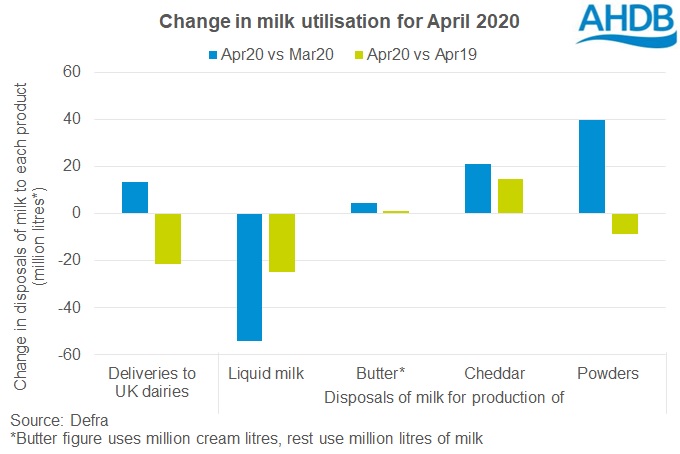April milk utilisation shows impact of lockdown
Wednesday, 10 June 2020
By Kat Jack
Milk processing in April saw a shift away from liquid milk and towards cheddar, powders and butter, the latest Defra figures confirm.

505 million litres of milk went into liquid milk in April, down 10% on March and down 5% on April 2019. This was influenced by the loss of the foodservice market in April due to coronavirus restrictions. Although retail sales of liquid milk went up, this was not enough to counterbalance the loss in demand from cafés, restaurants and catering.
Milk was instead diverted into making other products, to make use of the longer shelf-life and alternative sales opportunities. Milk into cheddar was up 8% on March and 5% on April 2019. Meanwhile, milk into butter (measured in cream litres) was up 14% on the month and 5% year on year. We would expect some month-on-month shift in milk utilisation to go with the seasonal lift in production, but these figures are in excess of the norm.
Milk volumes going into powders are the most subject to variation, as drying is often used to handle excess milk, and so powder production increases with the seasonal peak. Milk volumes into powders were down 7% year on year, despite some milk having to be disposed of either at the farm or once the fat had been removed. However, there was a 57% increase in milk going into powders between March and April 2020. At the same time last year, the increase was only 21%. This indicates a more sudden shift in the amount of excess milk, which is in line with the change in demand we saw from lockdown, but not enough to get up to last year’s level.
For cheddar, reports indicate that increased production mainly went into retail and stocks remain tight, as foodservice markets generally rely more on imported cheddar than domestic. For butter and powders, it is probable that some went into storage. Although storing product can help short-term, there are limitations to storage capacity and product will need to be sold eventually. Although UK restrictions have eased very little so far, some other countries in the EU have started to reopen in recent weeks, and the returning demand there has helped support UK markets.

Sign up to receive the latest information from AHDB.
While AHDB seeks to ensure that the information contained on this webpage is accurate at the time of publication, no warranty is given in respect of the information and data provided. You are responsible for how you use the information. To the maximum extent permitted by law, AHDB accepts no liability for loss, damage or injury howsoever caused or suffered (including that caused by negligence) directly or indirectly in relation to the information or data provided in this publication.
All intellectual property rights in the information and data on this webpage belong to or are licensed by AHDB. You are authorised to use such information for your internal business purposes only and you must not provide this information to any other third parties, including further publication of the information, or for commercial gain in any way whatsoever without the prior written permission of AHDB for each third party disclosure, publication or commercial arrangement. For more information, please see our Terms of Use and Privacy Notice or contact the Director of Corporate Affairs at info@ahdb.org.uk © Agriculture and Horticulture Development Board. All rights reserved.

